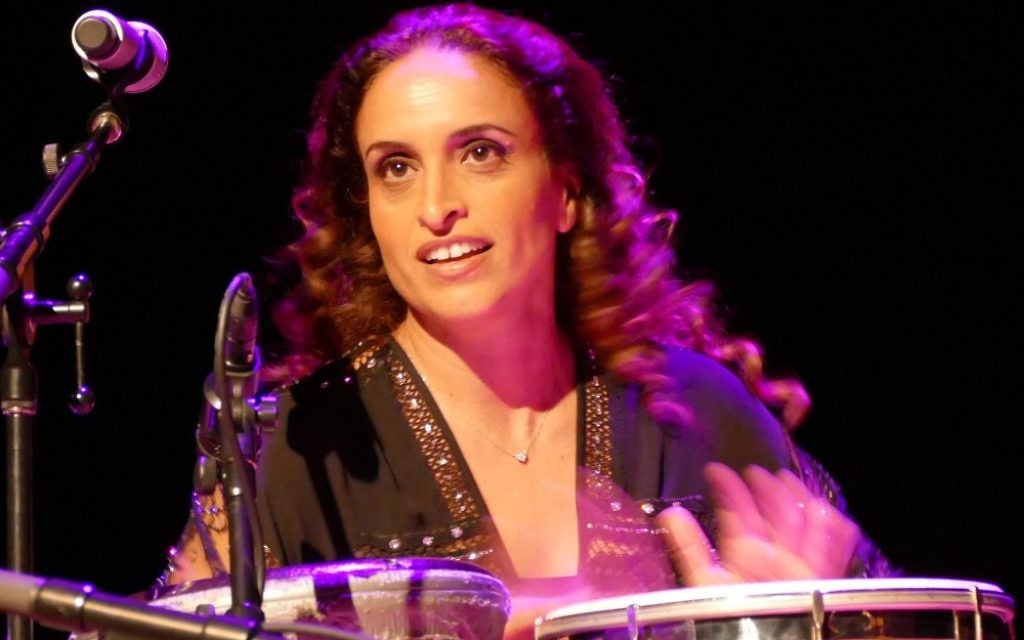Noa, LAMP Make Dialogue Matter
The Israeli singer and the Emory-Georgia Tech collaboration emphasize the value of open minds.

Respectful dialogue, debate and discussion are in short supply these days, but two Shabbat excursions Feb. 16 and 17 raised my hopes for humanity.
I went to Friday night services at Congregation Or Hadash because the Israeli singer Noa (Achinoam Nini) was speaking at the invitation of New Israel Fund, of which she is a board member, before her concert the next night at the Marcus JCC.
Whatever you think of NIF, whose efforts to promote an Israel striving toward its ideals can lead to grants to organizations that do more harm than good, Noa gets a bad rap. When she tours in the United States, she runs into opposition motivated by the false belief that she promotes cultural boycotts or is anti-Zionist.
Get The AJT Newsletter by email and never miss our top stories Free Sign Up
She has chosen not to perform in Israeli settlements in the West Bank for the past quarter-century, but that doesn’t make her Roger Waters. At Or Hadash, she declared several times that she is a Zionist — drawing a clear line between her and the likes of Jewish Voice for Peace and Linda Sarsour — and wants an Israel that is Jewish, democratic and separate from the Palestinians.
Noa said she has paid an unexpectedly high price for her peace activism, but that price is still less than the cost of doing nothing and losing the Israel she loves.
The most important part of her talk dealt with her recent visit to the West Bank at the invitation of settler leaders.
Noa and her hosts were able to have meaningful conversations despite their disagreements because of their shared dream of Israel as the Jewish homeland, living at peace with its neighbors. She and the settlers of Judaea and Samaria differ on the details of what that Israel will look like and how we get there, but the Zionist dream is alive and real on both sides.
That willingness to look for common ground as the basis for a discussion could serve as a valuable example in so many places and was a key part of the Jewish Federation of Greater Atlanta’s recent leadership mission to Israel to support its Front Porch initiative. You’ll see that as we run columns from participants, starting with thoughts from Harold Kirtz and Rabbi Ari Leubitz.
A more universal dialogue was on display the next day at Emory University during the fourth annual Leadership and Multifaith Program symposium, using the theme of “Religious & Scientific Perspectives on the Future of Life.” Video from symposium sessions should be online in early March, and it’s worth looking for if you’re open to having your mind blown.
But the point here isn’t to talk about the possible sentience of bacteria, or compassion and secular ethics, or what various faith traditions have to say about environmental protection, or even how astrobiologists are searching for life in space while re-creating evolution in labs on Earth.
Instead, it’s a reminder that the gaps between us are rarely as wide as we imagine. Ram Krishnamurthy of the Scripps Research Institute showed how religion and science run along parallel, compatible tracks when he presented eight Hindu principles and their scientific equivalents. Georgia Tech colleagues Amanda Stockton and Frank Rosenzweig, who show incredible imagination in envisioning experiments and instruments in the search for life, struggled to understand why anyone would see a conflict between evolution and G-d.
Perhaps the most important lesson to take away from the symposium was the suggestion by Emory biologist Arri Eisen after almost a decade of the Emory-Tibet Science Initiative that all good teaching is good translating.
The more time we spend trying to understand those we’re talking to, the less time we’ll have to spend trying to change their minds.




comments